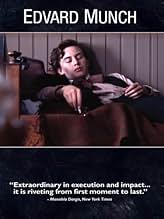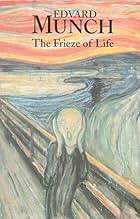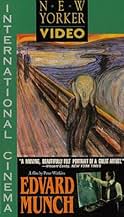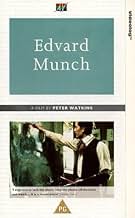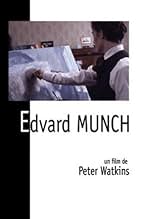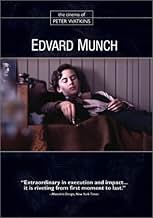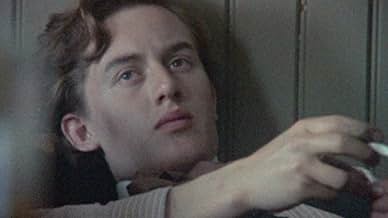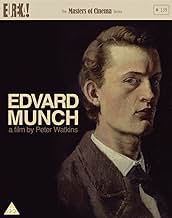Aggiungi una trama nella tua linguaThis biopic of Norwegian Expressionist painter Edvard Munch focuses on the influences that shaped his art, his devastating affair with a married woman that will haunt him for the rest of his... Leggi tuttoThis biopic of Norwegian Expressionist painter Edvard Munch focuses on the influences that shaped his art, his devastating affair with a married woman that will haunt him for the rest of his lifeThis biopic of Norwegian Expressionist painter Edvard Munch focuses on the influences that shaped his art, his devastating affair with a married woman that will haunt him for the rest of his life
- Regia
- Sceneggiatura
- Star
- Ha vinto 1 BAFTA Award
- 2 vittorie totali
- Inger Munch - 1875
- (as Anne Marie Dæhli)
Recensioni in evidenza
I had no idea how bleak Norwegian life was yet as the film postulates it is out of bleakness new ideas can flourish.
I enjoy the film most when 19th century life in the Norwegian city of Kristiania (Oslo) is described. The legalized prostitution, the walks/promenades, the puritan lifestyle.
I enjoyed it least post Munch's affair/relationship I understand Munch's obsession with his lover and I think they match it well with his desire to create art yet this I feel is also the weakest part of the film. The endless shot of him and her post relationship give the film a monotony that had me checking my watch and wondering "how long IS this film?"...
Still I feel it is worth watching as the way the film is shot has it moments when it makes you feel part of the Bohemian culture and pub life. It was like I was there, especially when the actors look into the camera.
It is also interesting to note that the actors had a huge part in creating and contributing lines to the film. A truly collaborative film...
The eponymous Munch's (played, like all here by amateur actor Geir Westby) life and career is dealt with in the usual Watkins style, focusing largely on the period between 1884 and 1894, a period in which his painting developed into what would become Expressionism. It shows a young man struggling with shyness and emotional immaturity, one that when confronted with rejection from Fru Heiberg (Gro Fraas), a married woman who has affairs with bohemian types (the film constantly reminds us of the historical realities of women in 19th century Norway, who require men to live), Munch becomes jealous and possessive. The film juxtaposes these emotional moments of anguish and the tragedies of Munch family fatalities that struck the young throughout his early life, with the development of Munch's painting style. Watkins shows throughout the actual painting process. Beginning with the breathtaking picture The Sick Child, Watkins shows the anger and psychological torment that went into it. The ways in which Munch attacked to painting with knives or the non-bristle end of the brush, which created a startlingly bleak image, devoid of unnecessary details.
Of course, as with anything different within an artistic medium, Munch's stripped down aesthetic was not met with praise initially, and Watkins shows the various vitriolic reactions from the art establishment and critics, both through over-heard conversations in gallery spaces, and the filmed interviews with detractors. During these moments, Munch can be seen skulking on the periphery, further exacerbating his deteriorating psychology, but this imbalance and possible fastidiousness influences his further subversion of the classical painting style - and one that would lead to German Expressionism. Periodically the narrator will place historical facts against the period portrayed, and the film is certainly as much about history (sometimes in relation to contemporary politics), as it is about an artist.
The bohemian group that Munch spent time with, headed by anarchist Hans Jaeger, would openly discuss political and social issues. Even women would be part of this group, and along with the formal discussion, the "film crew" interview various female exponents, discussing feminism and the role of the female within society. Placed within this historical context, the present (at least in 1974 when the film was released) was in what appeared to be a new sexual revolution, and the feminist movement was a media convention, but in 19th century Europe, these women see what they are able to achieve living within the constraints of a male dominated society. Whereas prostitution (in the '70's it was pornography) is socially seen as immoral and degrading, these female thinkers see it as motivating, a process of female empowerment. In Edvard Munch the women are self-contained, they are individual and have power over their own lives. But this is not exclusively inclusive of female characters, it is also a film (through its documentary style) that includes the audience.
Munch is the best use that I have seen of Watkins' idiosyncratic documentary style, because it is an emotional exploration, as well as a political one. The emotional aspects are embellished by the characters acknowledgement of the viewer. Throughout the film the characters look directly into the camera, addressing the audience with a glance, at times to question their own actions (should we do this?), or by including the audience in the emotional events that are occurring, you always feel included, even when those moments are incredibly voyeuristic. I at times even felt that I should not be privy to this, such was the effect of this connecting barrier. Like much of Watkins' work (and himself as a figure), Edvard Munch has been marginalised. Watkins' criticism of mass media has clearly left him out of main stream publication, and his work (whilst now gaining distribution and serious praise) is difficult to see commercially. Originally made for a Norwegian/Swedish television co-production, the film lost distribution due to the studios refusal to play it. The film did received an international release in a shortened version, but the 221 minute version is now accessible. It sounds exhausting, but the majesty and emotional connection the film presents makes it a beguiling and moving experience, and it is easily the most in depth exploration of the artistic process.
www.the-wrath-of-blog.blogspot.com
The style is one that mixes historical dramatization with documentary, one that through stream of consciousness editing attempts to immerse us not only into the period, but into Munch's mind. The actors regularly break the fourth wall which is a little jarring at first, but it creates an intimacy, as if you're in the room or they're speaking to you from across time.
I loved how the film set the context of life in Norway during this time - the poverty, the lack of child labor laws, the unfair treatment of women, and diseases like consumption/tuberculosis killing people at young ages. It also does a great job in immersing us into the bohemian circle Munch frequented early in his life, led by the radical Hans Jæger, as well as the intelligentsia he connected to later in Germany, led by ex-pat August Strindberg. These views of anarchism, free love, and severing ties to families were a part of what shaped him, though he always remained a little apart from it. The misogyny of the period is on full display, both from conservatives who believed women should simply be kept in the home, and from writers like Strindberg who believed women were inferior and had evil intentions. Unfortunately, Munch was also a misogynist, and to its credit, the film doesn't try to hide this fact.
It also explains the trauma in Munch's life, with his mother dying when he was 5, his favorite sister Sophie dying when he was 14, the conflicts he had with his father, and his difficulties in relationships. These personal forces involving angst, isolation, and melancholy, along with what was happening in the art world at this time (which is also well represented), are what shaped Munch as an artist. I loved the scenes of Munch creating his artwork, as there are some very nice reenactments and demonstrations of the techniques and media he used. The vicious criticism of his work in Norway, Germany, and Denmark is well captured, though it misses one of Munch's better known responses to realist painter Gustav Wentzel, who shouted at Munch "Shame on you. I had no idea that you were going to start painting that kind of thing. That sort of rubbish." Munch replied, "Well, we cannot all paint nails and twigs."
The editing style which serves the film so well early on eventually becomes a detractor though. There are times when it's unclear who's talking, and if what we're listening to are words that are from a diary or letter verbatim, or a historical dramatization. Again and again over the full run time we see cuts to footage of old lovers and a childhood sickbed scene, coughing up blood. There is also far too much detail on the love lives of people in Munch's circle, and this is to the detriment of leaving a lot of things out about Munch's old life. There is essentially nothing presented after 1895, when Munch was 32.
Here are just some of the things it leaves out:
- The literature that impressed Munch the most deeply was Poe's "Tales of Mystery and Imagination", and Dostoevsky's "The Idiot" and "The Brothers Karamazov". Like Dostoevsky, Munch was a gambler (though in Monte Carlo instead of Baden-Baden), believing he had a "system" at roulette.
- Munch's tumultuous relationships with Tulla Larsen and Eva Mudocci. At the end of his relationship with Larsen, she threatened to shoot herself, and when the revolver went off accidentally, it severed the top two joints of one of the fingers on Munch's left hand. See Larsen in good times in "Mathilde (Tulla) Larsen" (1898) and bad in "Sin (Nude with Red Hair)" (1901). See Mudocci in "Madonna (The Brooch)" (1903) and "Salome" (1903).
- His years wandering about Europe like a vagabond, excessively drinking, feeling persecuted, and depressed. He was involved in brawls, including one in which he "ran amok and assaulted several complete strangers in a hotel in Hamburg." His nervous breakdown in 1908, at the age of 45, would lead to confinement and shock therapy. Compare his paintings before and after this: "Self-Portrait with Wine Bottle" (1906) and "Self-Portrait at Clinic" (1909).
- Munch's deep sympathy with socialism and worker's rights. Here is what he said about communism: "I believe in what the Russians are trying to do, they have got the chance now. During the French Revolution it was the bourgeoisie who were fighting for their rights, now it is the workers, which is just as it should be." See his painting "Workers Returning Home" (1913-15). I always hate when these sides of an artist or historical figure are left out (e.g. Helen Keller).
- Munch eventually arriving at a place of greater peace. See the calmness and resignation in "The Dance of Death" (1915).
- The great controversy surrounding the competition to be selected as the artist for the Oslo University murals, which Munch was eventually awarded. See his absolutely brilliant painting "The Sun" (1916).
- Munch remained vital through his life. Towards the end he would paint the same subject on several canvases simultaneously, to allow for experimentation. Unfortunately, he would have a new set of German "art critics" to suffer: his work was branded degenerate by the Nazis, thrown out of German galleries, and sold to fund their war effort. When Norway became occupied by the Nazis when he was in his late seventies, his home and art studio were threatened by nearby tanks and anti-aircraft batteries. Munch painted on, but an explosion of a munitions dump blew out all of the windows of his house, and in the aftermath Munch contracted bronchitis and passed away.
If the film had been of conventional length, I could have appreciated the focus on his first 32 years, but that's less forgivable for me at 221 minutes. It's enjoyable nonetheless. For those interested in Munch, I'd also highly recommend the 1977 book by distinguished art historian Ragna Stang, which includes a very well researched account of his life and literally hundreds of plates of his art.
Lo sapevi?
- QuizThis film has a 100% rating based on 13 critic reviews on Rotten Tomatoes.
- Citazioni
Narrator: I felt as if there were invisible threads between us. I felt as if invisible threads from her hair still twisted themselves around me. And, when she completely disappeared there, over the ocean, then I felt still how it hurt, where my heart bled, because the threads could not be broken.
- ConnessioniReferenced in A Discussion with Peter Watkins (1977)
I più visti
Dettagli
Botteghino
- Lordo Stati Uniti e Canada
- 43.539 USD
- Fine settimana di apertura Stati Uniti e Canada
- 3961 USD
- 19 giu 2005
- Lordo in tutto il mondo
- 76.949 USD
Contribuisci a questa pagina


